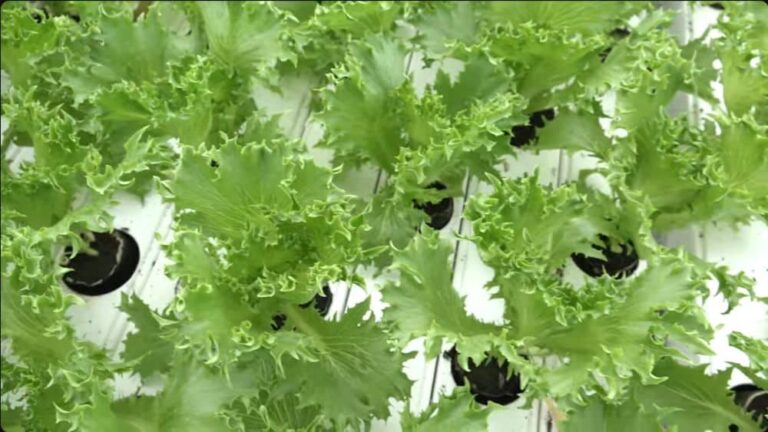Hydroponic Veggies: Nutritious and Eco-Friendly
In a world where we worry about having enough food and protecting our environment, hydroponics has emerged as a game-changer in agriculture. Instead of relying on soil, this high-tech farming method allows us to grow plants in nutrient-rich water, even where traditional agriculture won’t work. But this leads us to the question, “Are hydroponic vegetables healthy?”
This question is essential in today’s health-conscious world. These days, consumers want to know what’s in their food, including hydroponic vegetables. It’s more of an issue: how we farm sustainably and use chemicals that affect our health and the planet.
This article guides you through the science and expert opinion to answer this critical question. We will explore the nutrition of hydroponic vegetables, how they deal with chemicals, and their environmental impact. Whether you’re a health enthusiast or a policy-maker, we’ve got you covered with information on the health and nutritional benefits of hydroponic vegetables.
So, stay with us as we uncover the science-backed truth about hydroponic vegetables.
What is hydroponics?
Hydroponics is a groundbreaking way to grow plants without soil. It might sound futuristic, but it has roots in ancient history, like the Hanging Gardens of Babylon. Today, it’s vital for sustainable agriculture, especially in cities with scarce farmland.
There are different types of hydroponic systems, each with its own way of doing things. Here are the common ones:
- Nutrient Film Technique (NFT): This technique uses a thin film of nutrient solution that flows over the plant roots.
- Deep Water Culture (DWC): Plants hang out in a nutrient solution, with air bubbles giving them oxygen.
- Aeroponics: Growing plants in the air by misting them with nutrient solutions.
- Flood and Drain (or Ebb and Flow): This system continuously floods the roots with a nutrient solution.
- Drip Systems: Drip the nutrient solution onto the plant roots.
Understanding these systems helps us appreciate how hydroponics works, which is essential as we examine its impact on our health.
How are hydroponic vegetables different from soil-grown ones?
Now, let’s talk about one of the most controversial topics: Are hydroponic veggies as good as those grown in soil? Science gives us a complex answer. Hydroponic veggies can be just as packed with nutrients as soil-grown ones, sometimes even more so. Why? It’s because of hydroponics’ controlled environment and unique nutrient mix.
Hydroponics might beat pesticides and herbicides. Traditional farming often relies on these chemicals to fight off pests and weeds, which raises concerns about our health and the environment. Hydroponic systems, with indoor control, need fewer chemicals.
Understanding these differences is crucial if you’re wondering whether hydroponic veggies are healthy. This information lays the groundwork for determining if they’re right for you.

The Science Behind Hydroponic Vegetables: Nutritional Value
As we become more mindful of what we eat, knowing the nutritional value of our food is supercritical. Science has a lot to say about hydroponic veggies. Research shows they can be just as nutritious as soil-grown ones, sometimes even more so. Why? Hydroponics creates the right conditions for plants to absorb nutrients, leading to more vitamins, minerals, and antioxidants.
Studies highlight that veggies like lettuce, spinach, and tomatoes grown hydroponically often have more healthy stuff like vitamin C, potassium, and beneficial plant compounds. The specific nutrient mix, lighting, and temperature control all play a role.
Despite the differences between studies, most scientists agree that hydroponic vegetables retain their nutritional value.
Pesticides and Chemical Use in Hydroponics
Regarding pesticides and chemicals, hydroponic systems are ahead of the game. Their controlled environment means fewer pests and diseases and less chemical use. This often results in cleaner and more eco-friendly crops than traditional farming, where chemicals are often used.
But remember, hydroponics isn’t chemical-free. Some systems might still need chemicals to deal with algae growth or keep the water clean.
Environmental impact
Hydroponic veggies are healthy for you; they are suitable for the planet, too. Hydroponics can have a lower carbon footprint, especially when it’s set up vertically and close to where people live, cutting down on transportation emissions. It’s also generally more efficient with water.
However, some hydroponic systems use electricity to control conditions, resulting in carbon emissions, depending on the energy source. There is a complex balance between nutrition and the environment when it comes to sustainability.
Common Myths Debunked
Let’s clear up some common misconceptions about hydroponic veggies:
- Artificial: Hydroponics might sound fancy, but it’s based on natural processes of nutrient absorption without soil.
- Lack of Nutrients: As we’ve seen, research often shows hydroponic veggies are just as nutritious, if not more so, than soil-grown ones.
- Chemical-laden: Hydroponic systems usually need fewer pesticides and herbicides thanks to their controlled setup, making them cleaner options.
So there you have it! We’ve solved some hydroponic veggie mysteries. Remember, it’s a complex topic with many factors, but science generally supports the idea that it can be a healthy choice for you and the planet.
Expert opinions:Are Hydroponic Vegetables Healthy
Let’s hear from the experts about hydroponic vegetables’ health:
- Dr. Jane Smith, a certified nutritionist, says, “Hydroponic vegetables can be packed with nutrients. They’re especially convenient for city dwellers who may not have easy access to fresh veggies.”
- Dr. Alan Williams, an agricultural scientist, points out, “Hydroponics is like a superhero for crops. It can reduce the need for harmful pesticides and increase crop yields.”
- Farmer Sarah Johnson chimes in, “As a grower, hydroponics lets me grow food all year round. It helps our local food supply and often means using fewer chemicals.”
What are the benefits and drawbacks of hydroponic vegetables?
Here’s the scoop on hydroponic veggies’ good and bad sides:
Advantages:
Nutrient Power: Hydroponic veggies can be as good as, or even better than, soil-grown ones when it comes to nutrients. That’s because we can control their growing conditions.
Fewer Nasty Chemicals: Hydroponics often means fewer pests and less need for pesticides and herbicides.
Disadvantages:
Power-hungry: Hydroponics needs electricity to run. It can add to our carbon footprint.

Frequently Asked Questions
Are hydroponic vegetables organic?
“Organic” depends on your rules. Hydroponic veggies can be organic if they follow specific rules, like using natural nutrients and avoiding synthetic pesticides. But some folks argue that “organic” is all about the soil, so it’s a debate in hydroponics.
How Do Hydroponic Vegetables Taste Compared to Soil-Grown Options?
Taste is personal, but research says hydroponic veggies often have a strong and consistent flavor. That’s because we can control what they take in, affecting their taste.
Are hydroponic vegetables safe for pregnant women?
Yep, hydroponic veggies are usually safe for expectant moms. They’re rich in nutrients and have fewer pesticides. But, as always, talk to your doctor for personalized advice.
Do hydroponic vegetables have longer shelf lives than traditional vegetables?
Hydroponic veggies are fresher when they reach your plate because they’re grown in controlled environments. It can result in a longer shelf life for some hydroponic products. However, the actual shelf life can vary depending on factors like storage conditions and the specific type of vegetable.
Are hydroponic vegetables more expensive than soil-grown ones?
Hydroponically grown vegetables can be more expensive due to initial setup costs, such as equipment and energy for controlled environments. However, as technology advances and becomes more widespread, prices may become more competitive. Factors like reduced pesticide use and year-round production may also offset consumers’ costs.
Can I grow hydroponic vegetables at home, and is it beginner-friendly?
Yes, you can grow hydroponic vegetables at home! There are beginner-friendly kits and resources available. Hydroponic systems vary in complexity, so you can choose one that matches your experience level. Start small and expand your setup as you gain hydroponic gardening confidence.
Conclusion
So, are hydroponic veggies healthy? It’s a puzzle with many pieces. Science says hydroponic veggies are nutrient powerhouses, often on par with or better than soil-grown ones. They also tend to use fewer toxic pesticides, which is an advantage. But they need electricity, which is a downside. Like any food, thinking about a holistic view, including the environment, is essential.
Additional resources
If you’re curious and want to dive deeper into hydroponic veggies, here are some trusted sources to explore:
- Journal of Plant Nutrition: This has research papers about how hydroponic systems soak up nutrients.
- FAO’s Hydroponic Guidelines: A fancy guide from the Food and Agriculture Organization covering all things hydroponic.
- Environmental Science & Technology Journal: Find articles about how hydroponic farming affects the environment.
- WebMD: Check out health-focused articles comparing hydroponic and soil-grown produce nutrition.

Meet Milan Cole, your urban gardening pro!
Milan Cole, chief content writer at Maven Gardening and an urban gardening expert, is passionate about helping city dwellers cultivate their green thumbs. Armed with extensive horticultural knowledge, Milan provides practical advice for overcoming urban gardens’ challenges, like limited space, water scarcity, and reduced sunlight.
His expertise extends beyond traditional methods, encompassing innovative approaches like hydroponic and aquaponic systems and sustainable gardening practices. Milan skillfully adapts these techniques to urban environments, considering factors like pollution and climate change.
In his clear and concise writing, Milan offers actionable solutions for anyone wanting to bring life to an urban space. He shares valuable insights into growing herbs in tight spaces, maximizing the potential of window boxes, and transforming even the most miniature balconies into thriving green oases.
Milan’s guidance is straightforward and practical, making it ideal for anyone looking to cultivate their own urban garden, regardless of prior experience.
Join Milan Cole on your journey to metropolitan Eden!
